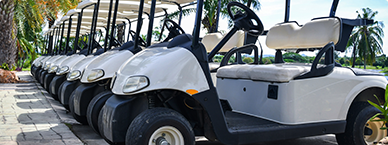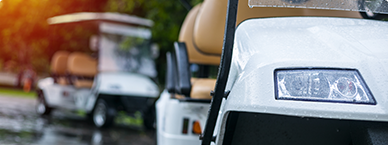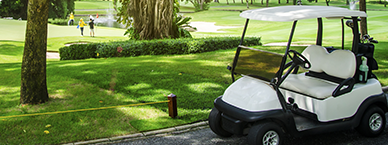Florida Golf Cart Car Accident Attorney
Golf carts are not just for golf courses anymore. They can be found at resorts, theme parks, apartment complexes, and shopping mall parking lots. Golf carts are also a popular mode of transportation for seniors to get around their active living communities like The Villages, Sun City, and hundreds of similar places dotted throughout the Sunshine State. Even when ridden on the golf course, golf cart operators must often take to the road to get from one hole to the next. In all of these situations, golf carts find themselves sharing the road with larger, heavier, and faster motor vehicles like cars, trucks and SUVs. Collisions happen, and when they do, the odds are not in the favor of the golf cart operator and their occupants.
Golf cart collisions with automobiles are not the same as crashes between two automobiles. The laws are different, the injuries are greater, and many other aspects of the case require specialized knowledge. If you were in a boat accident, you would look for an attorney experienced in boat accident cases, not car accidents. And if you’ve been hurt in a crash between a golf cart and an automobile, you need an attorney who is experienced in handling exactly this type of incident. You’ll find that experience at The Law Offices of Frank D. Butler, P.A., home of GolfCartAttorney. We have the knowledge, skills and dedication necessary to help achieve success on your injury claim, getting you the medical care and compensation you need and deserve when you’ve been hit by a speeding, negligent, or distracted driver. Call our experienced Florida golf cart car accident attorney today.
Golf Carts, LSVs, and Florida Traffic Safety Laws
Golf courses are big. They can cover 160 acres or more and often span public streets and roadways, requiring golf cart operators to travel on those roadways and cross streets during their play. Golf carts have also exploded in popularity and expanded beyond the golf course for use in many different places. Florida law and Florida Highway Safety and Motor Vehicles (FLHSMV), in turn, have put many rules and laws in place related to the safe operation of golf carts on Florida city streets.
Golf carts are street-legal in Florida. They may be operated on roadways that are designated for golf carts and have a posted speed limit of 30 miles per hour or less. Golf carts may also lawfully cross a county road that intersects an approved golf cart roadway, golf course or mobile home park.
Golf carts are defined by Florida Statutes 320.01(22) as motor vehicles that are designed and manufactured for operation on a golf course for sporting and recreational purposes and are not capable of exceeding speeds of 20 miles per hour. In contrast, another section of this same law, 320.01(41), defines a “low-speed vehicle” as any four-wheeled vehicle whose top speed is greater than 20 miles per hour but not greater than 25 miles per hour, including, but not limited to, neighborhood electric vehicles.
It’s very important after a collision with an automobile to know whether the golf cart involved in the crash would be classified as a golf cart or a low-speed vehicle (LSV) under Florida law. What the average person thinks of a golf cart might qualify as either a golf cart or an LSV, and the operator may not know what they have, but the legal distinctions are significant. An LSV can lawfully be operated on streets with a posted speed limit of up to 35 miles per hour, and they can cross intersections where the cross-street has a higher posted speed limit above 35 mph.
While anyone 14 years old or older can drive a golf cart, one must have a Florida driver’s license to operate an LSV in the state. LSVs must also meet numerous safety standards that don’t apply to golf carts. For instance, LSVs must be equipped with headlamps, mirrors, a windshield, turn signals, a parking brake and seat belts; you are not likely to find all of this equipment on a golf cart. LSVs must also have a Vehicle Identification Number (VIN) and must be registered and titled. Importantly, LSVs must be insured with no-fault personal injury protection (PIP) and Property Damage Liability (PDL). Golf carts, in contrast, do not need to be tiled, registered or insured.
Golf carts can be converted to LSVs. If they are, they must meet all the legal requirements of LSVs.
The Danger of Golf Cart Crashes With Cars Is Serious and Real
A study analyzing golf cart crashes reported in The Villages between 2011 and 2019 found an average of 136 crashes occurring every year, including 65 hospitalizations and nine people dead or disabled annually. Almost all of the disabling and fatal accidents occurred on streets or road pathways, with ejection occurring over 25% of the time. According to the study, “Death and disability, particularly due to ejection during GC [golf cart] crashes, occur at an alarming rate when GCs are used for local transportation.”
Contact GolfCartAttorney Today
Knowing the difference between a golf cart and a low-speed vehicle in Florida and why it matters after a crash are critical pieces of knowledge for a golf cart accident victim and their attorney to know. If your lawyer doesn’t already know these crucial pieces of information, they probably haven’t handled a golf cart/car accident claim successfully and they probably aren’t the lawyer for you. At GolfCartAttorney we know the answers because we do golf cart injury cases all the time and have a record of success you can rely on to know you are getting dedicated, effective representation from a skilled and knowledgeable golf cart accident attorney. Call The Law Offices of Frank D. Butler today for a free consultation with an experienced Florida golf cart car accident lawyer.



